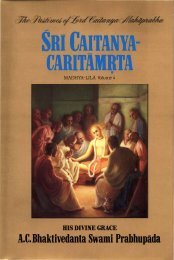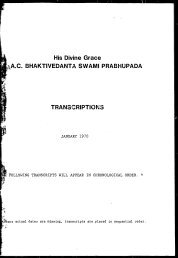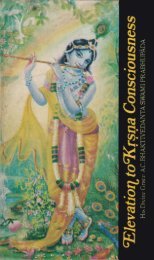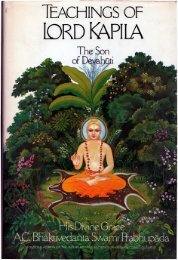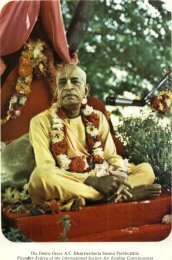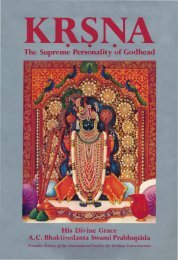- Page 1 and 2:
-SRI CAITAN A--CARITAMRTAMADHYA-LIL
- Page 3 and 4:
--SRI CAITANYA-CARITAMRTA•
- Page 5 and 6:
All Glory to rT Guru and Gauranga--
- Page 7 and 8:
ContentsIntroductionviChapter 17Cha
- Page 9 and 10:
Sri Caitanya-caritamrtaThe subject
- Page 11 and 12:
His Divine GraceA. C. Bhaktivedanta
- Page 14:
PLATE TWO"When Sri Caitanya Mahapra
- Page 18:
PLATE FOUR"Sri Caitanya Mahaprabhu
- Page 22:
PLATE SIX"While walking, Sri Caitan
- Page 26:
PLATE EIGHT"While crossing the Rive
- Page 30:
PLATE TEN"When all the cowherd boys
- Page 34 and 35:
CHAPTER 17The Lord Travels to Vrnda
- Page 36 and 37:
Text 5]The Lord Travels to Vrndavan
- Page 38 and 39:
Text 10]The Lord Travels to Vrndava
- Page 40 and 41:
Text 14)The Lord Travels to Vrndava
- Page 42 and 43:
Text 17] The Lord Travels to Vrndav
- Page 44 and 45:
Text 22]The Lord Travels to Vrndava
- Page 46 and 47:
Text 26] The Lord Travels to Vrndav
- Page 48 and 49:
Text 31] The Lord Travels to Vfndav
- Page 50 and 51:
Text 33] The Lord Travels to Vndava
- Page 52 and 53:
Text 37]The lord Travels to Vrndava
- Page 54 and 55:
Text 41] The Lord Travels to Vndava
- Page 56 and 57:
Text 46] The Lord Travels to Vrndav
- Page 58 and 59:
Text 50]The Lord Travels to Vrndava
- Page 60 and 61:
Text 53] The Lord Travels to Vrndav
- Page 62 and 63:
Text 57]The Lord Travels to Vrndava
- Page 64 and 65:
Text 61] The lord Travels to Vrndav
- Page 66 and 67:
Text 66]The Lord Travels to Vrndava
- Page 68 and 69:
Text 70] The lord Travels to Vrndav
- Page 70 and 71:
Text 75] The Lord Travels to Vndava
- Page 72 and 73:
Text 80]The Lord Travels to Vrndava
- Page 74 and 75:
Text 83]The Lord Travels to Vrndava
- Page 76 and 77:
Text 86] The lord Travels to Vrndav
- Page 78 and 79:
Text 90]The Lord Travels to Vndavan
- Page 80 and 81:
Text 94] The Lord Travels to Vrndav
- Page 82 and 83:
Text 96] The lord Travels to Vrndav
- Page 84 and 85:
Text 99] The Lord Travels to Vrndav
- Page 86 and 87:
Text 103]The Lord Travels to Vrndav
- Page 88 and 89:
Text 104]The Lord Travels to Vrndav
- Page 90 and 91:
Text 108] The lord Travels to Vrnda
- Page 92 and 93:
Text 113]The Lord Travels to Vrndav
- Page 94 and 95:
Text 116]The Lord Travels to Vrndav
- Page 96 and 97:
Text 121]The Lord Travels to Vndava
- Page 98 and 99:
Text 125]The Lord Travels to Vrndav
- Page 100 and 101:
Text 128] The Lord Travels to Vndav
- Page 102 and 103:
Text 132]The lord Travels to Vndava
- Page 104 and 105:
Text 134]The Lord Travels to Vndava
- Page 106 and 107:
Text 137]The Lord Travels to Vndava
- Page 108 and 109:
Text 139]The Lord Travels to Vrndav
- Page 110 and 111:
Text 142]The Lord Travels to Vrndav
- Page 112 and 113:
Text 145] The Lord Travels to Vrnda
- Page 114 and 115:
Text 148]The Lord Travels to Vrndav
- Page 116 and 117:
Text 152]The Lord Travels to Vrndav
- Page 118 and 119:
Text 156]The Lord Travels to Vrndav
- Page 120 and 121:
Text 160]The Lord Travels to Vrndav
- Page 122 and 123:
Text 165]The Lord Travels to Vndava
- Page 124 and 125:
Text 169] The Lord Travels to Vrnda
- Page 126 and 127:
Text 174]The Lord Travels to Vrndav
- Page 128 and 129:
Text 178]The Lord Travels to Vndava
- Page 130 and 131:
Text 182]The lord Travels to Vrndav
- Page 132 and 133:
Text 184]The Lord Travels to Vrndav
- Page 134 and 135:
Text 185] The Lord Travels to Vrnda
- Page 136 and 137:
Text 185]The Lord Travels to Vrndav
- Page 138 and 139:
Text 186] The Lord Travels to Vrnda
- Page 140 and 141:
Text 190]The lord Travels to Vrndav
- Page 142 and 143:
Text 194]The Lord Travels to Vrndav
- Page 144 and 145:
Text 199]The Lord Travels to Vrndav
- Page 146 and 147:
Text 2031 The lord Travels to Vrnda
- Page 148 and 149:
Text 20·81 The Lord Travels to Vrn
- Page 150 and 151:
Text 212] The Lord Travels to Vrnda
- Page 152 and 153:
Text 216]The Lord Travels to Vrndav
- Page 154 and 155:
Text 220]The Lord Travels to Vrndav
- Page 156 and 157:
Text 225]The Lord Travels to Vrndav
- Page 158 and 159:
Text 230] The Lord Travels to Vrnda
- Page 160 and 161:
Text 234] The Lord Travels to Vrnda
- Page 162 and 163:
CHAPTER 18Lord Sri Caitanya Mahapra
- Page 164 and 165:
Text 4] The Lord's Visit to Sri Vrn
- Page 166 and 167:
Text 8] The lord's Visit to Sri Vnd
- Page 168 and 169:
Text 12] The Lord's Visit to Sri Vr
- Page 170 and 171:
Text 16] The Lord's Visit to Sri Vr
- Page 172 and 173:
Text 21]The Lord's Visit to Sri Vrn
- Page 174 and 175:
Text 25) The Lord's Visit to Sri Vr
- Page 176 and 177:
Text 291The Lord's Visit to Sri Vrn
- Page 178 and 179:
Text 33] The Lord's Visit to Sri Vn
- Page 180 and 181:
Text 37] The Lord's Visit to Sri Vr
- Page 182 and 183:
Text 40]The Lord's Visit to Sri Vrn
- Page 184 and 185:
Text 44] The Lord's Visit to Sri Vr
- Page 186 and 187:
Text 48] The Lord's Visit to Sri Vn
- Page 188 and 189:
Text 51] The Lord's Visit to Sri Vr
- Page 190 and 191:
Text 54]The Lord's Visit to Sri Vrn
- Page 192 and 193:
Text 58]The Lord's Visit to Sri Vnd
- Page 194 and 195:
Text 62]The Lord's Visit to Sri Vrn
- Page 196 and 197:
Text 65]The Lord's Visit to Sri Vnd
- Page 198 and 199:
Text 68] The Lord's Visit to Sri Vr
- Page 200 and 201:
Text 72]The Lord's Visit to Sri Vrn
- Page 202 and 203:
Text 77]The lord's Visit to Sri Vrn
- Page 204 and 205:
Text 82]The Lord's Visit to Sri Vrn
- Page 206 and 207:
Text 86] The Lord's Visit to Sri Vn
- Page 208 and 209:
Text 91]The Lord's Visit to Sri Vrn
- Page 210 and 211:
Text 95] The Lord's Visit to Sri Vr
- Page 212 and 213:
Text 99]The Lord's Visit to Sri Vrn
- Page 214 and 215:
Text 102]The lord's Visit to Sri Vr
- Page 216 and 217:
Text 107]The Lord's Visit to Sri Vr
- Page 218 and 219:
Text 110] The Lord's Visit to Sri V
- Page 220 and 221:
Text 113]The Lord's Visit to Sri Vr
- Page 222 and 223:
Text 115)The lord's Visit to Sri Vr
- Page 224 and 225:
Text 119] The lord's Visit to Sri V
- Page 226 and 227:
Text 124] The Lord's Visit to Sri V
- Page 228 and 229:
Text 126] The Lord's Visit to Sri V
- Page 230 and 231:
Text 131]The Lord's Visit to Sri Vr
- Page 232 and 233:
Text 135] The Lord's Visit to Sri V
- Page 234 and 235:
Text 139] The Lord's Visit to Sri V
- Page 236 and 237:
Text 144] The Lord's Visit to Sri V
- Page 238 and 239:
Text 147]The lord's Visit to Sri Vn
- Page 240 and 241:
Text 151] The lord's Visit to Sri V
- Page 242 and 243:
Text 156]The Lord's Visit to Sri Vr
- Page 244 and 245:
Text 161] The Lord's Visit to Sri V
- Page 246 and 247:
Text 166] The lord's Visit to Sri V
- Page 248 and 249:
Text 170] The Lord's Visit to Sri V
- Page 250 and 251:
Text 175]The Lord's Visit to Sri Vr
- Page 252 and 253:
Text 179] The Lord's Visit to Sri V
- Page 254 and 255:
Text 184]The Lord's Visit to Sri Vr
- Page 256 and 257:
Text 189] The Lord's Visit to Sri V
- Page 258 and 259:
Text 193] The Lord's Visit to Sri V
- Page 260 and 261:
Text 197] The Lord's Visit to Sri V
- Page 262 and 263:
Text 2021 The Lord's Visit to Sri V
- Page 264 and 265:
Text 206] The lord's Visit to Sri V
- Page 266 and 267:
Text 210]The Lord's Visit to Sri Vr
- Page 268 and 269:
Text 214] The lord's Visit to Sri V
- Page 270 and 271:
Text 219]The Lord's Visit to Sri Vr
- Page 272 and 273:
Text 222] The Lord's Visit to Sri V
- Page 274 and 275:
Text 227]The Lord's Visit to Sri Vr
- Page 276 and 277:
Text 229] The Lord's Visit to Sri V
- Page 278 and 279:
246 Sri Caitanya-caritamrta [Madhya
- Page 280 and 281:
248 Sri Caitanya-caritamrta [Madhya
- Page 282 and 283:
250 Sri Caitanya-caritamrta [Madhya
- Page 284 and 285:
252 Sri Caitanya-caritamrta [Madhya
- Page 286 and 287:
254 Sri Caitanya-caritamta [Madhya-
- Page 288 and 289:
256 Sri Caitanya-caritamrta [Madhya
- Page 290 and 291:
258 Sri Caitanya-caritamrta [Madhya
- Page 292 and 293:
260 Sri Caitanya-caritamrta [Madhya
- Page 294 and 295:
262 Sri Caitanya-caritamrta [Madhya
- Page 296 and 297:
264 Sri Caitanya-caritamrta [Madhya
- Page 298 and 299:
266 Sri Caitanya-caritamrta [Madhya
- Page 300 and 301:
268 Sri Caitanya-caritamrta [Madhya
- Page 302 and 303:
270 Sri Caitanya-caritamrta [Madhya
- Page 304 and 305:
272 Sri Caitanya-caritamrta [Madhya
- Page 306 and 307:
274 Sri Caitanya-caritamrta [Madhya
- Page 308 and 309:
276 Sri Caitanya-caritamrta [Madhya
- Page 310 and 311: 278 Sri Caitanya-caritamrta [Madhya
- Page 312 and 313: 280 Sri Caitanya-caritamrta [Madhya
- Page 314 and 315: 282 Sri Caitanya-caritamrta [Madhya
- Page 316 and 317: 284 Sri Caitanya-caritamrta [Madhya
- Page 318 and 319: 286 Sri Caitanya-caritamrta [Madhya
- Page 320 and 321: 288 Sri Caitanya-caritamrta [Madhya
- Page 322 and 323: 290 Sri Caitanya-caritamrta [Madhya
- Page 324 and 325: 292 Sri Caitanya-caritamrta [Madhya
- Page 326 and 327: 294 Sri Caitanya-caritamrta [Madhya
- Page 328 and 329: 296 Sri Caitanya-caritamrta [Madhya
- Page 330 and 331: 298 Sri Caitanya-caritamrta [Madhya
- Page 332 and 333: 300 Sri Caitanya-caritamrta [Madhya
- Page 334 and 335: 302 Sri Caitanya-caritamrta [Madhya
- Page 336 and 337: 304 Sri Caitanya-caritamrta [Madhya
- Page 338 and 339: 306 Sri Caitanya-caritamrta [Madhya
- Page 340 and 341: 308 Sri Caitanya-caritamrta [Madhya
- Page 342 and 343: 310 Sri Caitanya-caritamrta [Madhya
- Page 344 and 345: 312 Sri Caitanya-caritamrta [Madhya
- Page 346 and 347: 314 Sri Caitanya-caritamrta [Madhya
- Page 348 and 349: 316 Sri Caitanya-caritamrta [Madhya
- Page 350 and 351: 318 Sri Caitanya-caritamrta [Madhya
- Page 352 and 353: 320 Sri Caitanya-caritamrta [Madhya
- Page 354 and 355: 322 Sri Caitanya-caritamrta [Madhya
- Page 356 and 357: 324 Sri Caitanya-caritamrta [Madhya
- Page 358 and 359: 326 Sri Caitanya-caritamrta [Madhya
- Page 362 and 363: 330 Sri Caitanya-caritamrta [Madhya
- Page 364 and 365: 332 Sri Caitanya-caritamrta [Madhya
- Page 366 and 367: 334 Sri Caitanya-caritamrta [Madhya
- Page 368 and 369: 336 Sri Caitanya-caritamrta [Madhya
- Page 370 and 371: 338 Sri Caitanya-caritamrta [Madhya
- Page 372 and 373: - - --340 Sri Caitanya-caritamrta [
- Page 374 and 375: 342 Sri Caitanya-caritamrta [Madhya
- Page 376 and 377: 344 Sri Caitanya-caritamrta [Madhya
- Page 378 and 379: 346 Sri Caitanya-caritamrta[Madhya-
- Page 380 and 381: 348 Sri Caitanya-caritamrta [Madhya
- Page 382 and 383: 350 Sri Caitanya-caritamrta [Madhya
- Page 384 and 385: 352 Sri Caitanya-caritamrta [Madhya
- Page 386 and 387: 354 Sri Caitanya-caritamrta[Madhya-
- Page 388 and 389: 356 Sri Caitanya-caritamrta [Madhya
- Page 390 and 391: 358 Sri Caitanya-caritamrta [Madhya
- Page 392 and 393: 360 Sri Caitanya-caritamrta [Madhya
- Page 394 and 395: 362 Sri Caitanya-caritamrta [Madhya
- Page 396 and 397: 364 Sri Caitanya-caritamrta [Madhya
- Page 398 and 399: 366 Sri Caitanya-caritamrta [Madhya
- Page 400 and 401: 368 Sri Caitanya-caritamrta [Madhya
- Page 402 and 403: 370 Sri Caitanya-caritamrta [Madhya
- Page 404 and 405: 372 Sri Caitanya-caritamrta [Madhya
- Page 406 and 407: 374 Sri Caitanya-caritamrta [Madhya
- Page 408 and 409: 376 Sri Caitanya-caritamrta [Madhya
- Page 410 and 411:
378 Sri Caitanya-caritamrta[Madhya-
- Page 412 and 413:
380 Sri Caitanya-caritamrta [Madhya
- Page 414 and 415:
382 Sri Caitanya-caritamrta [Madhya
- Page 416 and 417:
384 Sri Caitanya-caritamrta [Madhya
- Page 418 and 419:
386 Sri Caitanya-caritamrta [Madhya
- Page 420 and 421:
388 Sri Caitanya-caritamrta [Madhya
- Page 422 and 423:
390 Sri Caitanya-caritamrta [Madhya
- Page 424 and 425:
392 Sri Caitanya-caritamrta [Madhya
- Page 426 and 427:
394Sri Caitanya-caritamrta[Madhya-l
- Page 428 and 429:
396 Sri Caitanya-caritamrta [Madhya
- Page 430 and 431:
398 Sri Caitanya-caritamrta [Madhya
- Page 432 and 433:
400 Sri Caitanya-caritamrta [Madhya
- Page 434 and 435:
402 Sri Caitanya-caritamrta [Madhya
- Page 436 and 437:
404 Sri Caitanya-caritamrta [Madhya
- Page 438 and 439:
406 Sri Caitanya-caritamrta [Madhya
- Page 440 and 441:
408 Sri Caitanya-caritamrtaMuQ(iaka
- Page 442 and 443:
410 Sri Caitanya-caritam!'faDDama -
- Page 444 and 445:
412 Sri Caitanya-caritam!1aMaha-man
- Page 446 and 447:
414 Sri Caitanya-caritamrtaSuddha-b
- Page 448 and 449:
416 Sri Caitanya-caritam!'faThe) le
- Page 450 and 451:
418 Sri Caitanya-caritamrtaanya-van
- Page 452 and 453:
420 Sri Caitanya-caritamrtada5a-sah
- Page 454 and 455:
422Sri Caitanya-caritampaHJhantayam
- Page 456 and 457:
424 Sri Caitanya-caritamrtakrK1aves
- Page 458 and 459:
426 Sri Caitanya-caritamrtanijanuru
- Page 460 and 461:
428 Sri Caitanya-caritamrtapremaves
- Page 462 and 463:
430 Sri Caitanya-caritamasei kurx;l
- Page 464 and 465:
432 Sri Caitanya-caritamrtatanha la
- Page 466 and 467:
434 Sri Caitanya-caritamftayad yad
- Page 468 and 469:
436 Sri Caitanya-caritlmaAssociatio
- Page 470 and 471:
438 Sri Caitanya-caritlmrtaBrahma-b
- Page 472 and 473:
440 Sri Caitanya-caritamrtaDevotees
- Page 474 and 475:
442 Sri Caitanya-caritamrtaGoddess
- Page 476 and 477:
444 Sri Caitanya-caritam!'faTSanaac
- Page 478 and 479:
446 Sri Caitanya-caritamrtaKumarasc
- Page 480 and 481:
448 Sri Caitanya-caritamrtaMercyign
- Page 482 and 483:
450 Sri Caitanya-caritamrtaPrakrta-
- Page 484 and 485:
452 Sri Caitanya-caritamrtaSarikara
- Page 486 and 487:
454 Sri Caitanya-caritamrtaSukadeva
- Page 488 and 489:
456 Sri Caitanya-caritamrtaViQUBrah
- Page 490 and 491:
The AuthorHis Divine Grace A C. Bha
- Page 492 and 493:
(continued from front flap)Madhya-l







